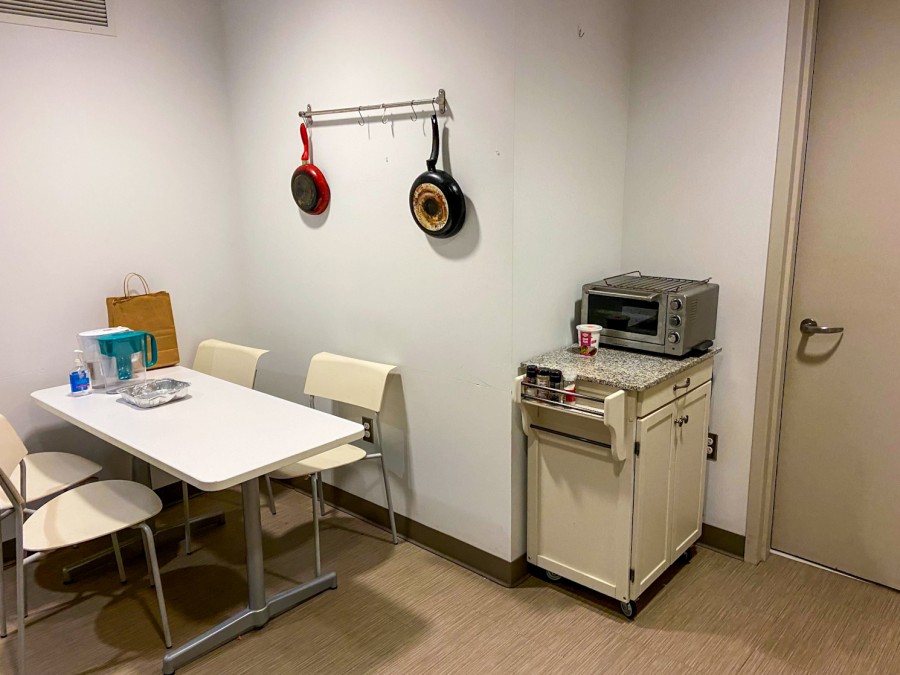Cooking in the capital at NYU DC
NYU Washington, D.C., encourages students to become chefs in the face of high local dining prices.
Unlike NYU’s degree-granting campuses, the study away site in Washington, D.C., does not have dining facilities. When studying in this expensive city, students cook at home to keep food costs low. (Photo by Rahul Mahesh)
April 14, 2022
WASHINGTON 一 The nation’s capital, home to an NYU study away site, has an impressive range of restaurants for students to splurge on every now and then. Food in Washington, however, is expensive — especially on a college student’s budget — and NYU provides few alternatives. In order to survive the semester, figuring out where and how to eat is a central component of the NYU Washington, D.C., experience.
Unlike NYU’s Washington Square, Brooklyn, Abu Dhabi and Shanghai campuses, NYU Washington, D.C., has no dining halls or canteens. The closest students can find to pre-prepared food is the vending machine that occupies a singular room on campus.
It’s easy enough to order food from the array of restaurants in downtown Washington. The selection ranges from major fast-food chains such as McDonald’s, Chipotle or Jimmy John’s to more unique restaurants, such as Arepa Zone, a Venezuelan cafe, or Bombay Street Food, an Indian eatery.
However, ordering out becomes an issue 一 food in Washington isn’t cheap. Luckily, NYU Washington, D.C., provides students with an invaluable resource that makes the student dining experience almost seamless: a kitchen.
At NYU Washington, D.C., each four-student suite comes with a kitchen containing two hot plates, a microwave, a toaster oven, a fridge and extensive cabinet storage. The simple layout and ample amenities suggest that shopping for groceries and cooking at home is fundamental to the student experience. In fact, one of the school orientation trips is to a massive Asian grocery store in Virginia.
From fresh fruits and vegetables to a selection of tasty frozen meals, students often return to the dorm after this trip with an influx of groceries for the weeks ahead. Throughout the semester, it is common to see students with large Walmart and Trader Joe’s shopping bags, two chains offering reputably affordable ingredients. While many students at NYU Washington, D.C., are busy with internships and community projects, cooking serves multiple purposes and enhances the campus’s culture and focus on preparing students for independent living after graduation.
LS first-year Dhruv Patel cooks most of his meals at home and fights the temptation to order takeout.
“Cooking in an expensive big city like D.C. is much more affordable and convenient than ordering from a restaurant or fast-food chain,” Patel said. “Cooking for myself also helps me take control of my diet, which may have been a bit more difficult if I was eating entirely off of the selections provided in traditional dining halls with a meal plan … Staying healthy also makes it certain that I can engage with all the events that NYU D.C. has to offer, from excursions such as kayaking on the Potomac River, biking across Capitol Hill or going to career networking events such as the Meal Connections program and meeting people who work in industries that interest me.”
NYU Washington, D.C., provides ample opportunities for cross-cohort networking, including hosting discussions on career topics with industry-focused guests and the Meal Connections program, a popular series of staff-organized events that allows students to try local restaurants at no cost. Still, the student body always works to increase their own engagement.
LS first-year Tyler Ni found ample outlets to make impactful connections through sharing meals and cooking with fellow peers.
“Food, in general, helps bring together students from both the first-year and upper-year cohorts, and when someone cooks and shares their food, it helps build a bond,” Ni said. “While a dining hall would’ve been more convenient and freed up my time, I think the benefits of cooking have enhanced my sense of community here at NYU D.C. and helped me better understand my professional future.”
Upperclassmen also show enthusiasm for cooking as a key part of the NYU D.C. experience.
“Cooking has helped me find a sense of community and get to know people here at the campus.” said Farzana Tasnim, a Gallatin student currently studying and interning in Washington. “On my first night, I cooked shrimp pasta for my suitemates and friends, and it was an awesome bonding activity … Additionally, I’m working on putting together a potluck to help build community and share experiences about NYU and internships, an important part of the NYU D.C. experience.”
It’s clear that in order to balance both your budget and diet at NYU Washington, D.C., a willingness to cook is a must. That way, students can obtain the proper nutrition needed to stay healthy and keep their food expenditures within reasonable boundaries 一 a recipe for success to navigate university life and the professional world in the nation’s capital.
Contact Rahul Mahesh at [email protected].
























































































































































